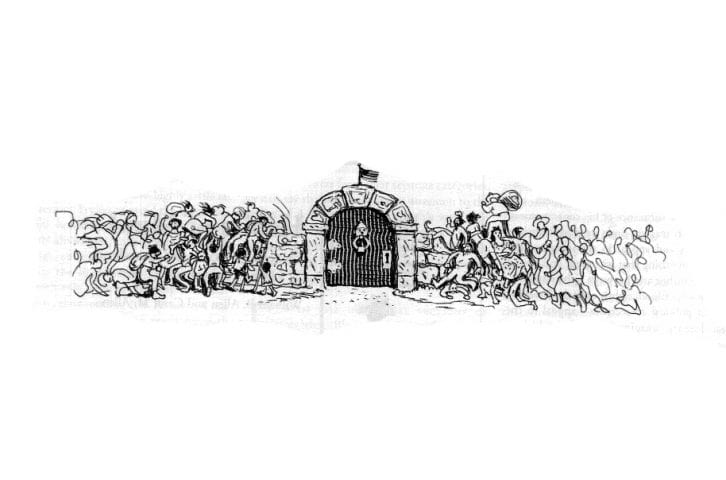Books Reviewed
In an age when liberal democracy and liberal modes of thought are more dominant than ever before, a time indeed when modernity itself seems increasingly old-fashioned and the very memory of the pre-modern world risks disappearing from our education, it is remarkable to what extent contemporary academic debates on moral and political matters reflect the presence of Aristotle.
As recently as 30 years ago, “the Philosopher,” as Thomas Aquinas called him, was widely dismissed as a thinker of merely historical interest. More than that, he was seen as the epitome of everything wrong with pre-modern modes of thought. He was condemned by social scientists for deducing values from facts, by the hard scientists for his addiction to metaphysics and an outmoded teleological understanding of nature, by the philosophy professors for his dogmatism and neglect of the problem of language, by Marxists and fashionable continental thinkers for his neglect of history, and by liberals everywhere for his retrograde views on slavery, women, and ethnicity.
In ethics and politics, above all, Aristotle’s core doctrines seemed to disqualify him as an interlocutor of standing in the contemporary academy. The priority he assigned to the community over the individual, the emphasis on virtue rather than freedom or self-realization, the preference for aristocracy over democracy—all seemed to point to an unacceptably conservative if not indeed proto-totalitarian outlook. At the very least, the matrix of Aristotle’s thought—the warlike polis of classical Greece and the aristocratic ethical code embedded in its traditional culture—created a seemingly insuperable obstacle to taking him seriously in the bourgeois democracies of the late 20th century.
Yet there it is. In Aristotle and Modern Politics, we have on display an Aristotle who is smartly up-to-date and protean in his ability to appeal to self-confessed liberals, libertarians, communitarians, social democrats, and otherwise respectable American scholars in search of exits from various blind alleys of contemporary thought and practice. If the Aristotle on offer is sometimes a bit of a challenge to recognize (as in Martha C. Nussbaum’s pointedly titled piece “Aristotelian Social Democracy”), this volume nevertheless performs a signal service. In addition to exploring how Aristotelian insights can be drawn upon to advance contemporary intellectual and policy debates, it also begins what is probably an overdue effort to correct misrepresentations of the authentic Aristotle by some of his recent champions.
The dramatic turnaround in Aristotle’s fortunes today seems to reflect cultural and political as well as strictly intellectual developments. In the United States (which continues to lead the way in this regard), the rise of an articulate and sophisticated conservative movement sparked interest in Aristotle and other older thinkers simply as alternatives to liberal orthodoxy, itself in an advanced state of political stagnation and intellectual decay. At the same time, the increasingly evident failure of the Soviet experiment, and the bankruptcy of socialist thought more generally, encouraged a reorientation on the American Left, away from the “participatory democracy” of the 1960s and toward more traditional models of social solidarity or community. This “communitarian turn,” with its rediscovery of the republican and civic humanist traditions of early modernity, inevitably invited a new openness to and appropriation of Aristotle, the remote inspiration of these traditions. There are points of contact as well between Aristotle and the notion of “deliberative democracy” associated primarily with the radical German thinker Jürgen Habermas.
The second kind of explanation has to do with the intellectual power and the impact of particular thinkers. Central here is the role of the late John Rawls, whose A Theory of Justice (1971) did a great deal to rehabilitate political philosophy as a legitimate intellectual enterprise, while also establishing Aristotle, if not as a philosophical authority for liberals, at any rate as a resource to be selectively mined by them rather than a sworn enemy. Important too is Alasdair MacIntyre, whoseAfter Virtue (1981) and later books make a powerful case for a return to Aristotelian ethics in response to the moral incoherence and relativism of contemporary Western culture. But a number of older thinkers must also be mentioned. In her influential The Human Condition (1958), Hannah Arendt used Aristotle to recover the centrality of the political dimension of civic life, lost from sight under the impact of liberal individualism and its invention of the private sphere. And Leo Strauss and Hans-Georg Gadamer used him in various ways as a point of departure in challenging the founding assumptions of contemporary social science and recovering the idea of prudence or political judgment.
* * *
As Aristide Tessitore makes clear in his introduction, the Aristotelian renaissance (as he calls it) cannot be properly understood without tracing its roots in the Weimar era of modern Germany. Arendt, Strauss, and Gadamer were all students or associates of Martin Heidegger, the premier figure in German philosophical circles then and after. Heidegger’s assault on modern philosophy, his return to the thought-world of pre-philosophic experience (especially that of ancient Greece), and his penetrating exegesis of Aristotelian texts showed the way—a way he did not himself follow—to a critical reappropriation of Platonic-Aristotelian philosophy, freed both of the encrustations of the scholastic centuries and the prejudices of Enlightenment rationalism. The recovery of Aristotelian “practical philosophy” also proved an attractive response to what Tessitore calls the “crisis” in the relationship between theory and practice, famously articulated by the great sociologist Max Weber.
Perhaps the best essays in this volume are three that critically examine contemporary thinkers or movements that are in varying degrees friendly to Aristotle or claim inspiration from him. Bernard Yack’s discussion of the idea of community in Aristotle is a powerful corrective to communitarian interpreters who seek support in his texts for their own vision of social solidarity. Yack persuasively argues that Aristotle’s notion of “community” (koinônia) has little to do with the romanticized Gemeinschaft of modern social theory, on which these interpreters often draw. Writing in explicit opposition to the extreme communitarianism of Plato’s Republic, Aristotle emphasizes the heterogeneous character of the political community, if not the inevitability of political conflict. His account of man as a political animal is far from the nostalgia-driven visions of contemporary communitarianism.
In a sympathetic yet critical analysis of Alasdair MacIntyre’s neo-Aristotelian project, Tessitore argues that MacIntyre’s attempt to reconcile the objectivity of Aristotelian ethics with the relativism of contemporary historical consciousness is unconvincing and concedes too much to the relativist argument. He rightly objects to the crudity of MacIntyre’s interpretation of Aristotle on a number of key issues—notably, the dependence of his thought on the transient phenomenon of the polis and other elements of classical Greek culture, his belief in a unity of the virtues, and his commitment to a biologically based, teleological view of human nature. For MacIntyre, Aristotle remains relevant to us only to the extent that he has been absorbed into a larger classical-Christian “tradition” whose presiding spirit is St. Thomas Aquinas. Whatever its possible merits, this approach is not very helpful for trying to understand Aristotle as he understood himself.
As David K. O’Connor shows in a subtle and penetrating essay, Leo Strauss’s various discussions of Aristotle from the mid-1940s to the mid-1960s are not just about understanding Aristotle, but serve as well to work out Strauss’s own complex relationship with Heidegger. Strauss had to find a way to appropriate Heidegger’s insight into the essential continuity of philosophy with the world of ordinary human concerns, while resisting Heidegger’s call for a philosophical stance of resolute engagement with politics. Strauss’s emphasis on the radically contemplative character of the philosophic life for Aristotle, as well as for the Greek philosophers generally, needs to be appreciated in this context—the context, that is, of an engagement with Heidegger at a level that can only be called esoteric, inasmuch as Strauss rarely names his interlocutor in his published writings. The puzzling question is whether Strauss on this account fails to do justice to the self-proclaimed practical intention of Aristotelian political and moral philosophy.
Much more could be said about this excellent volume. Mention should be made particularly of Stephen S. Salkever’s fine analysis of “deliberative democracy” in the work of Habermas and the later Rawls, which doctrine seems to be in the process of eclipsing communitarianism as the chief competitor to liberalism today. Other topics include Aristotle on justice (Susan D. Collins); liberalism, virtue, and Christian theology (Charles R. Pinches); contemporary legal theory (Miriam Galston); and Aristotle on property and commerce (Jill Frank, Douglas J. Den Uyl, and Douglas B. Rasmussen). It is not a complaint to say that it would have been helpful to have comparable papers on Arendt, Gadamer, and perhaps other German scholars (such as the late political scientist Wilhelm Hennis) who have contributed to the rediscovery of Aristotelian “practical philosophy” in recent years. There is in any event a rich field here for further work.




